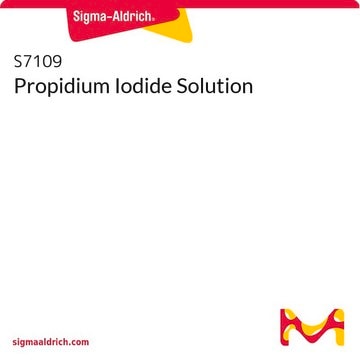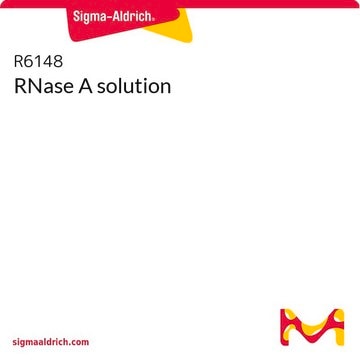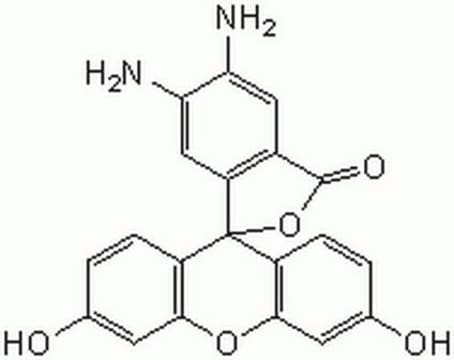81845
Iodure de propidium
≥94% (HPLC)
Synonyme(s) :
Diiodure de 3,8-diamino-5-[3-(diéthylméthylammonio)propyl]-6-phénylphénanthridinium diiodide
About This Item
Produits recommandés
Niveau de qualité
Pureté
≥94% (HPLC)
Forme
powder
Pf
220-225 °C (dec.) (lit.)
Fluorescence
λex 482 nm; λem 608 nm (pH 7.2)
λex 540 nm; λem 608 nm (bound to DNA)
Température de stockage
2-8°C
Chaîne SMILES
[I-].[I-].CC[N+](C)(CC)CCC[n+]1c(-c2ccccc2)c3cc(N)ccc3c4ccc(N)cc14
InChI
1S/C27H33N4.2HI/c1-4-31(3,5-2)17-9-16-30-26-19-22(29)13-15-24(26)23-14-12-21(28)18-25(23)27(30)20-10-7-6-8-11-20;;/h6-8,10-15,18-19,29H,4-5,9,16-17,28H2,1-3H3;2*1H/q+1;;/p-1
Clé InChI
XJMOSONTPMZWPB-UHFFFAOYSA-M
Vous recherchez des produits similaires ? Visite Guide de comparaison des produits
Description générale
Application
- to stain DNA in cell cycle analysis
- to stain cells and cell nuclei
- for the preparation of propidium iodide (PI)stock solution
- to stain cells for flow cytometry
Caractéristiques et avantages
Conditionnement
Mention d'avertissement
Warning
Mentions de danger
Conseils de prudence
Classification des risques
Muta. 2
Code de la classe de stockage
11 - Combustible Solids
Classe de danger pour l'eau (WGK)
WGK 3
Point d'éclair (°F)
Not applicable
Point d'éclair (°C)
Not applicable
Équipement de protection individuelle
dust mask type N95 (US), Eyeshields, Gloves
Faites votre choix parmi les versions les plus récentes :
Déjà en possession de ce produit ?
Retrouvez la documentation relative aux produits que vous avez récemment achetés dans la Bibliothèque de documents.
Les clients ont également consulté
Articles
Apoptosis regulation involves multiple pathways and molecules for cellular homeostasis.
Apoptosis regulation involves multiple pathways and molecules for cellular homeostasis.
Apoptosis regulation involves multiple pathways and molecules for cellular homeostasis.
Apoptosis regulation involves multiple pathways and molecules for cellular homeostasis.
Contenu apparenté
Three-dimensional (3D) printing of biological tissue is rapidly becoming an integral part of tissue engineering.
Three-dimensional (3D) printing of biological tissue is rapidly becoming an integral part of tissue engineering.
Three-dimensional (3D) printing of biological tissue is rapidly becoming an integral part of tissue engineering.
Three-dimensional (3D) printing of biological tissue is rapidly becoming an integral part of tissue engineering.
Notre équipe de scientifiques dispose d'une expérience dans tous les secteurs de la recherche, notamment en sciences de la vie, science des matériaux, synthèse chimique, chromatographie, analyse et dans de nombreux autres domaines..
Contacter notre Service technique










